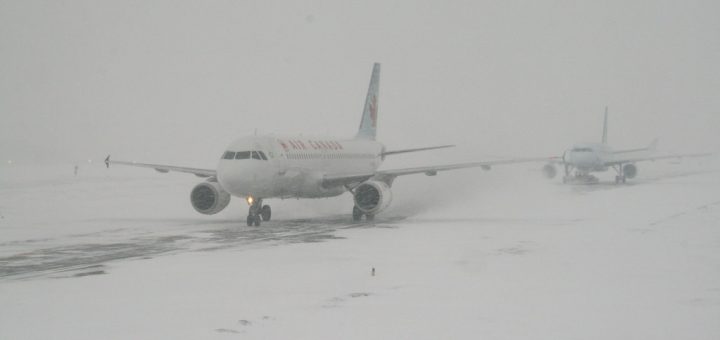To Disclose or Not to Disclose: SCC Grants Leave in Transportation Safety Board of Canada v Kathleen Carroll-Byrne, et al.

In Canada (Transportation Safety Board) v Carroll-Byrne, 2021 NSCA 34 [Carroll-Byrne], the Transportation Safety Board of Canada (“the Board”) sought to appeal the Supreme Court of Nova Scotia’s (“NSSC”) interlocutory decision (Carroll-Byrne v Air Canada, 2019 NSSC 339 [Air Canada]) to allow the conditional release of the contents of the cockpit voice recorder (“CVR”) of an Air Canada flight on March 29, 2015. Justice Duncan of the NSSC determined that the public interest in the administration of justice outweighed the statutory privilege attached to the CVR. The Board appealed to the Nova Scotia Court of Appeal (“NSCA”), but the NSCA dismissed its appeal, agreeing with Justice Duncan’s reasoning and ultimate decision. On October 14, 2021, the Supreme Court of Canada (“SCC”) granted the Board’s leave to appeal.
Facts and Background
On March 29, 2015, just after midnight, Air Canada Flight 624 attempted to land at Halifax International Airport during a snowstorm and crashed 740 feet short of the runway. The individual litigants commenced a class proceeding against multiple parties, alleging negligence causing injury (Air Canada, para 1). The defendants included Air Canada, Halifax International Airport Authority, and the pilot and first officer of Flight 624 (Carroll-Byrne, para 7).
The Board investigated the crash and detailed its findings in a report. Although the report considered the contents of the CVR, the Board did not provide a copy of the CVR. In response, the individual litigants brought a motion to disclose the CVR before the NSSC (Carroll-Byrne, para 9). To oppose this motion, the Board and the Air Canada Pilots Association were granted intervenor status (Carroll-Byrne, para 7).
Issues on Appeal to the NSCA
The NSCA granted leave to appeal, then decided on three grounds of appeal by answering the following questions:
- Did the judge err in not giving the Board an opportunity to make ex parte submissions to the judge?
- Were the judge’s reasons for 1 insufficient?
- Did the judge err in determining that the public interest in the proper administration of justice outweighed the statutory privilege associated with the CVR?
The Issue of Ex Parte Submissions
The Board argued that it was entitled to make ex parte submissions before Justice Duncan’s decision. It relied on section 28(6)(b) of the Canadian Transportation Accident Investigation and Safety Board Act, S.C. 1989, c. 3 [the Act], which states:
(6) Notwithstanding anything in this section, where, in any proceedings before a court or coroner, a request for the production and discovery of an on-board recording is made, the court or coroner shall
(b) in camera, examine the on-board recording and give the Board a reasonable opportunity to make representations with respect thereto (Emphasis added).
The Board claimed that the words “in camera” entitled it to not only examine the on-board recording in camera but also make its representations ex parte (Carroll-Byrne, para 24). The NSCA refuted this claim as there is a clear distinction between “in camera” and “ex parte.” “In camera” means “within the room” and usually refers to legal proceedings that are closed to the public. “Ex parte” refers to doing something without notice to other adverse parties (Carroll-Byrne, para 25). The NSCA also pointed out that Parliament could have used the words “ex parte” in s. 28(6)(b), but chose not to (Carroll-Byrne, para 27). Based on those reasons, the NSCA denied the Board’s argument that ex parte submissions are “implicitly authorized” by s. 28(6) (Carroll-Byrne, para 31).
The Board also argued that it was entitled to make ex parte submissions because it was “uniquely placed to assist the Court in determining the significance” of the CVR as it was the only party aware of its contents (Carroll-Byrne, para 44). The NSCA dismissed this argument as the Board could not describe how its ex parte submissions would have impacted the court’s analysis. In addition, Justice Duncan already stated in his decision that he did not need assistance to understand the contents of the CVR (Carroll-Byrne, para 45).
The Board asserted that Justice Duncan’s reasons for refusing ex parte submissions failed to disclose an “intelligible basis” (Carroll-Byrne, para 48). However, the NSCA concluded that Justice Duncan made no error of law in his interpretation that would warrant a change, and therefore, gave sufficient reasons for refusing ex parte submissions from the Board (Carroll-Byrne, para 51).
Public Interest in the Administration of Justice vs. Importance of Statutory Privilege
The NSCA also addressed whether Justice Duncan erred in determining that the public interest in the administration of justice outweighed the statutory privilege associated with the CVR. To do so, the court considered the correct balancing test, the reliability and relevance of the evidence in the context of the case, the public interest in the administration of justice, and the importance of the privilege (Carroll-Byrne, para 54).
The Correct Balancing Test
The Board argued that Justice Duncan applied the wrong test in his decision by relying on Wappen-Reederei GmbH & Co. KG v Hyde Park (The), 2006 FC 150 [Hyde Park] rather than Société Air France et al v Greater Toronto Airports Authority, [2009] O.J. No. 5337 [Air France]. However, the NSCA noted that Air France had considered Hyde Park and “subsumed” the criteria in Hyde Park with only one minor material distinction (Carroll-Byrne, para 56). This distinction was the exclusion of the “miscarriage of justice” test, which was not suitable for the “prospective balancing” required by s. 28(6)(c) of the Act (Carroll-Byrne, para 58). Therefore, Justice Duncan applied the correct test.
Reliability and Relevance of the Evidence
In regards to the CVR, Justice Duncan determined that it was reliable as evidence and that it was relevant to “causation and the particulars of negligence leading to loss and damages pleaded by the plaintiffs” (Carroll-Byrne, para 64). Furthermore, Justice Duncan found that the CVR was the only way to obtain certain information (Carroll-Byrne, para 67). As the Board did not identify any material errors in his consideration of the evidence, the NSCA concluded that Justice Duncan’s determination on reliability and relevance of the CVR as evidence was sound (Carroll-Byrne, para 68).
Public Interest in the Administration of Justice
To explain the public interest in the administration of justice, Justice Duncan quoted directly from the decision in Air France, explaining that it “refers primarily to the public interest in the fairness of the trial process” (Carroll-Byrne, para 69). Air France also stated that the goal of behaviour modification in class actions increases the public interest in “ensuring that the information available to the court … is as complete and reliable as possible” (Carroll-Byrne, para 69). As the contents of the CVR exclusively held certain information, there was strong public interest to disclose the contents of the CVR for the proper administration of justice (Carroll-Byrne, para 71).
Importance of Statutory Privilege
The Board raised two major concerns about breaking the statutory privilege attached to the CVR: interest in pilots’ privacy and interest in safety. To address the concern over privacy, the NSCA noted that Justice Duncan referred to Air France again. Specifically, Air France pointed out that cockpit policy usually prohibits non-operational communications during descent, such as personal matters, and that judicial examination processes would “screen out any irrelevant exclamations” made during descent (Carroll-Byrne, para 76).
Air France also denied that disclosure of the CVR would impact safety by having a “chilling” effect on encouraging open and timely communications between pilots because there was no evidentiary basis for this argument (Carroll-Byrne, para 76). The judge in Air France could not accept that the pilots would “curtail critical communications, endangering … the safety of their passengers” simply because of the possibility that their communications might be disclosed in a legal proceeding (Carroll-Byrne, para 76). Similarly, both Justice Duncan and the NSCA were unconvinced by the evidence supporting the prohibition of disclosure over safety concerns. The NSCA noted that Justice Duncan highlighted evidence from the former Chairman of the United States National Transportation Safety Board, who expressed that disclosure of the CVR could “only assist the public’s and the aviation industry’s knowledge of the circumstances of an accident and therefore improve aviation safety for all of us” (Carroll-Byrne, para 79).
The NSCA’s Conclusion
The NSCA opined that Justice Duncan appropriately considered and weighed all the pertinent factors; he reasoned that the disclosure of the CVR was necessary for the public interest in the administration of justice because the evidence was reliable, relevant, contained information otherwise unavailable, and would not “unduly compromise flight officer privacy” and “safety” (Carroll-Byrne, para 85). As Justice Duncan’s reasoning was comprehensive and sound, the NSCA concluded that his decision is “entitled to deference” and dismissed the Board’s appeal (Carroll-Byrne, para 86).
Analysis & Future SCC Decision
The main task at hand for Justice Duncan and the NSCA was the weighing of the interests between the public interest in the administration of justice and the importance of the statutory privilege attached to the CVR. In my opinion, Justice Duncan and the NSCA made the correct decision in favouring the former over the latter. In this case, there were clear and compelling reasons to forgo privilege and disclose the CVR: the evidence was reliable, relevant, and perhaps most importantly, contained crucial information otherwise unavailable to the legal process. In addition to those reasons, the NSCA, in providing deference to Justice Duncan’s decision, noted that he ordered the contents of the CVR to “remain confidential” and be used only “for the purposes of these proceedings only” (Air Canada, para 69). This strictly limited use of the CVR, as well as the points made in Air France, should subdue any concerns over the pilots’ privacy.
I agree with the NSCA that the Board did not present convincing arguments to counter the reasons to disclose the CVR recordings. The Board attempted numerous legal avenues to overturn Justice Duncan’s decision, from arguing for an opportunity to make ex parte submissions to discussing the potential negative effects that disclosure of the CVR may have on public safety. The argument that the disclosure of the CVR would hinder communication between pilots was an especially important one to address as the safety of passengers was at issue. But as Air France noted, non-operational communications are usually already strictly prohibited during descent. In addition, pilots should not be curtailing non-operational communications just because their conversations may be disclosed during a legal proceeding; they should already be held to a strict and professional standard in their communications regardless of any potential disclosure of the CVR. This decision did not downplay the importance of statutory privilege nor the concerns surrounding the breaking of privilege. Instead, it merely refuted the Board’s questionable arguments based on the importance of privilege.
When this case comes before the SCC, I do not see how the SCC will overturn the NSCA’s decision. The reasons for permitting disclosure in this case far outweigh the reasons not to disclose. The public interest in the proper administration of justice has much more to lose if the SCC prohibits disclosure than what the pilots stand to lose if the SCC permits disclosure. If the SCC forbids disclosure of the CVR, the legal process will miss key pieces of information that may be crucial for deciding whether the pilots were negligent. On the other hand, it is debatable whether the pilots even stand to lose privacy if the SCC permits disclosure. If the SCC weighs the interests between the public interest in the administration of justice and the importance of privilege in relation to the facts and background of this case, I think the court will come to the inevitable conclusion that disclosure of the CVR recordings is warranted in this case. The SCC should come to this conclusion so that the court can set a precedent showing that the breaking of statutory privilege is appropriate when there are compelling reasons to do so.








Join the conversation